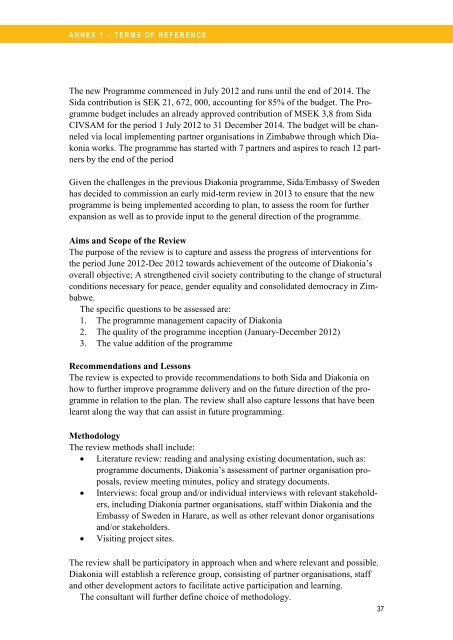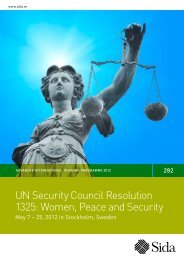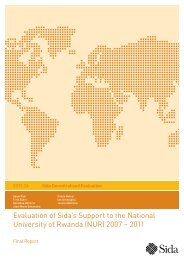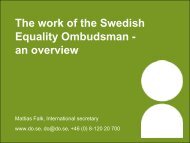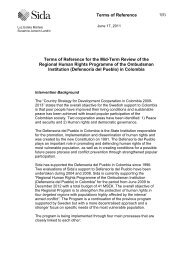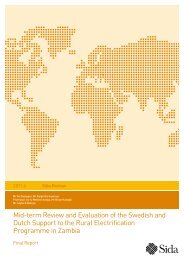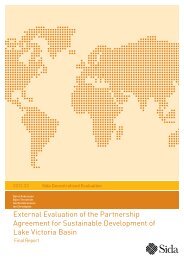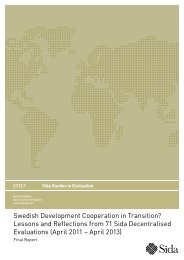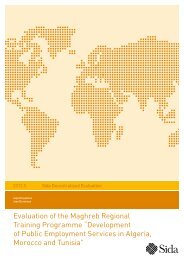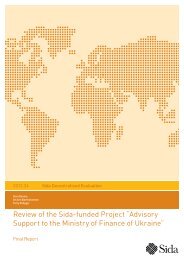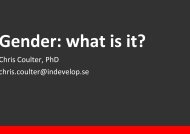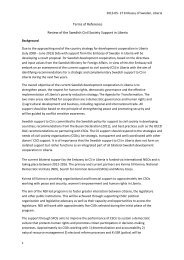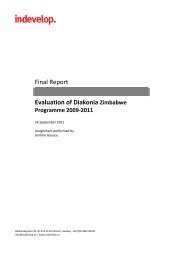Mid-term Review of the Diakonia Strategic Peace Building ... - Sida
Mid-term Review of the Diakonia Strategic Peace Building ... - Sida
Mid-term Review of the Diakonia Strategic Peace Building ... - Sida
Create successful ePaper yourself
Turn your PDF publications into a flip-book with our unique Google optimized e-Paper software.
A N N E X 1 – T E R M S O F R E F E R E N C E<br />
The new Programme commenced in July 2012 and runs until <strong>the</strong> end <strong>of</strong> 2014. The<br />
<strong>Sida</strong> contribution is SEK 21, 672, 000, accounting for 85% <strong>of</strong> <strong>the</strong> budget. The Programme<br />
budget includes an already approved contribution <strong>of</strong> MSEK 3,8 from <strong>Sida</strong><br />
CIVSAM for <strong>the</strong> period 1 July 2012 to 31 December 2014. The budget will be channeled<br />
via local implementing partner organisations in Zimbabwe through which <strong>Diakonia</strong><br />
works. The programme has started with 7 partners and aspires to reach 12 partners<br />
by <strong>the</strong> end <strong>of</strong> <strong>the</strong> period<br />
Given <strong>the</strong> challenges in <strong>the</strong> previous <strong>Diakonia</strong> programme, <strong>Sida</strong>/Embassy <strong>of</strong> Sweden<br />
has decided to commission an early mid-<strong>term</strong> review in 2013 to ensure that <strong>the</strong> new<br />
programme is being implemented according to plan, to assess <strong>the</strong> room for fur<strong>the</strong>r<br />
expansion as well as to provide input to <strong>the</strong> general direction <strong>of</strong> <strong>the</strong> programme.<br />
Aims and Scope <strong>of</strong> <strong>the</strong> <strong>Review</strong><br />
The purpose <strong>of</strong> <strong>the</strong> review is to capture and assess <strong>the</strong> progress <strong>of</strong> interventions for<br />
<strong>the</strong> period June 2012-Dec 2012 towards achievement <strong>of</strong> <strong>the</strong> outcome <strong>of</strong> <strong>Diakonia</strong>’s<br />
overall objective; A streng<strong>the</strong>ned civil society contributing to <strong>the</strong> change <strong>of</strong> structural<br />
conditions necessary for peace, gender equality and consolidated democracy in Zimbabwe.<br />
The specific questions to be assessed are:<br />
1. The programme management capacity <strong>of</strong> <strong>Diakonia</strong><br />
2. The quality <strong>of</strong> <strong>the</strong> programme inception (January-December 2012)<br />
3. The value addition <strong>of</strong> <strong>the</strong> programme<br />
Recommendations and Lessons<br />
The review is expected to provide recommendations to both <strong>Sida</strong> and <strong>Diakonia</strong> on<br />
how to fur<strong>the</strong>r improve programme delivery and on <strong>the</strong> future direction <strong>of</strong> <strong>the</strong> programme<br />
in relation to <strong>the</strong> plan. The review shall also capture lessons that have been<br />
learnt along <strong>the</strong> way that can assist in future programming.<br />
Methodology<br />
The review methods shall include:<br />
Literature review: reading and analysing existing documentation, such as:<br />
programme documents, <strong>Diakonia</strong>’s assessment <strong>of</strong> partner organisation proposals,<br />
review meeting minutes, policy and strategy documents.<br />
Interviews: focal group and/or individual interviews with relevant stakeholders,<br />
including <strong>Diakonia</strong> partner organisations, staff within <strong>Diakonia</strong> and <strong>the</strong><br />
Embassy <strong>of</strong> Sweden in Harare, as well as o<strong>the</strong>r relevant donor organisations<br />
and/or stakeholders.<br />
Visiting project sites.<br />
The review shall be participatory in approach when and where relevant and possible.<br />
<strong>Diakonia</strong> will establish a reference group, consisting <strong>of</strong> partner organisations, staff<br />
and o<strong>the</strong>r development actors to facilitate active participation and learning.<br />
The consultant will fur<strong>the</strong>r define choice <strong>of</strong> methodology.<br />
37


